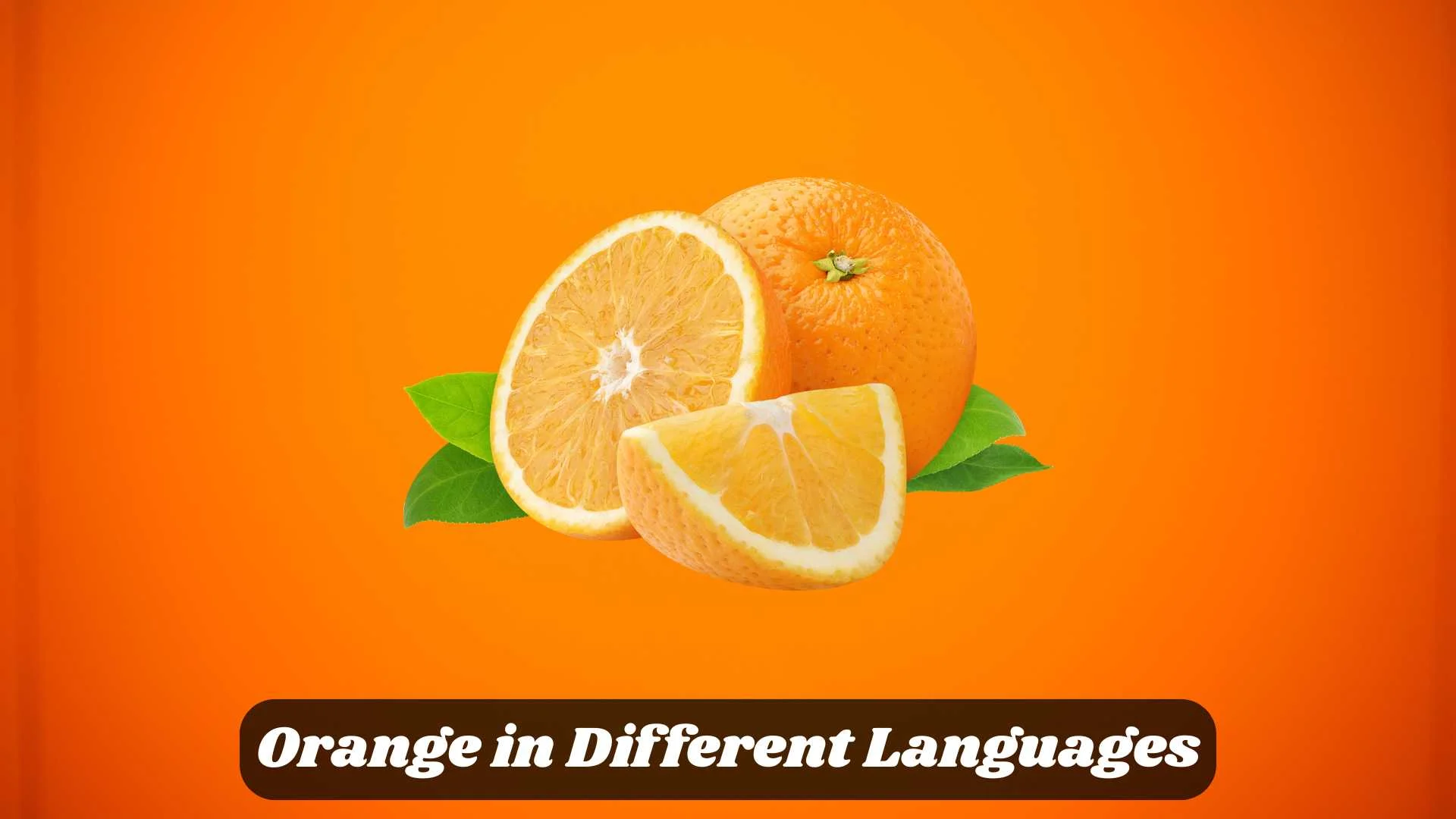Have you ever wondered how to say “orange” in different parts of the world?
Whether you’re thinking of the juicy fruit, the bright color, or the warm feeling it brings, the word “orange” has a special charm everywhere.
In this article, we’ll explore Orange in Different Languages, discovering how people across cultures express this vibrant and cheerful word.
This guide is written just for you — the kind of reader who loves learning new words, exploring global languages, and finding connections through simple everyday things.
As you go through this list, you’ll see how beautifully each language captures the energy and brightness of “orange.”
By the end, you might even find a new favorite way to say it — one that feels as refreshing as the fruit itself!
🌍 How to Say Orange in 70 Different Languages
- English (🇬🇧) – Orange | Pronunciation: OR-inj
Example: I love the taste of orange juice. - Spanish (🇪🇸) – Naranja | Pronunciation: nah-RAHN-hah
Example: El color naranja es brillante. (The color orange is bright.) - French (🇫🇷) – Orange | Pronunciation: oh-RAHNJ
Example: L’orange est mon fruit préféré. (Orange is my favorite fruit.) - German (🇩🇪) – Orange | Pronunciation: oh-RAHN-guh
Example: Ich liebe den Duft von Orangen. (I love the scent of oranges.) - Italian (🇮🇹) – Arancia | Pronunciation: ah-RAHN-chah
Example: L’arancia è dolce e succosa. (The orange is sweet and juicy.) - Portuguese (🇵🇹) – Laranja | Pronunciation: lah-RAHN-zhah
Example: O suco de laranja é delicioso. (Orange juice is delicious.) - Russian (🇷🇺) – Апельсин (Apel’sin) | Pronunciation: ah-pyel-SEEN
Example: Я люблю апельсиновый сок. (I love orange juice.) - Chinese (Mandarin) (🇨🇳) – 橙子 (Chéngzi) | Pronunciation: chung-zuh
Example: 我喜欢橙子的味道。 (I like the taste of orange.) - Japanese (🇯🇵) – オレンジ (Orenji) | Pronunciation: oh-REN-jee
Example: オレンジは甘くておいしいです。 (Orange is sweet and tasty.) - Korean (🇰🇷) – 오렌지 (Orenji) | Pronunciation: oh-ren-jee
Example: 오렌지 주스는 상큼해요. (Orange juice is refreshing.) - Arabic (🇸🇦) – برتقال (Burtuqāl) | Pronunciation: bur-too-KAAL
Example: أحب عصير البرتقال. (I love orange juice.) - Hindi (🇮🇳) – संतरा (Santaraa) | Pronunciation: sun-TAH-rah
Example: संतरा एक स्वादिष्ट फल है। (Orange is a delicious fruit.) - Urdu (🇵🇰) – سنگترہ (Sangtara) | Pronunciation: sung-TAH-rah
Example: مجھے سنگترے کا جوس پسند ہے۔ (I like orange juice.) - Turkish (🇹🇷) – Portakal | Pronunciation: por-tah-KAHL
Example: Portakal suyu tazedir. (The orange juice is fresh.) - Greek (🇬🇷) – Πορτοκάλι (Portokáli) | Pronunciation: por-to-KAH-lee
Example: Το πορτοκάλι είναι νόστιμο. (The orange is tasty.) - Hebrew (🇮🇱) – תפוז (Tapuz) | Pronunciation: tah-POOZ
Example: אני אוהב מיץ תפוזים. (I love orange juice.) - Thai (🇹🇭) – ส้ม (Som) | Pronunciation: sohm
Example: ฉันชอบน้ำส้มมาก. (I really like orange juice.) - Vietnamese (🇻🇳) – Cam | Pronunciation: kahm
Example: Nước cam rất ngon. (Orange juice is delicious.) - Swahili (🇰🇪) – Chungwa | Pronunciation: choong-wah
Example: Ninapenda juisi ya chungwa. (I love orange juice.) - Zulu (🇿🇦) – Iwolintshi | Pronunciation: ee-woh-LIN-chee
Example: Ngithanda iwolintshi elisha. (I love fresh orange.) - Polish (🇵🇱) – Pomarańcza | Pronunciation: poh-mah-RAN-cha
Example: Lubię sok pomarańczowy. (I like orange juice.) - Dutch (🇳🇱) – Sinaasappel | Pronunciation: SEE-nahs-ah-pel
Example: Sinaasappels zijn gezond. (Oranges are healthy.) - Swedish (🇸🇪) – Apelsin | Pronunciation: ah-pel-SEEN
Example: Jag tycker om apelsinjuice. (I like orange juice.) - Finnish (🇫🇮) – Appelsiini | Pronunciation: ah-pel-SEE-nee
Example: Appelsiini on makea hedelmä. (The orange is a sweet fruit.) - Hungarian (🇭🇺) – Narancs | Pronunciation: NAH-ranch
Example: A narancs finom gyümölcs. (The orange is a tasty fruit.) - Czech (🇨🇿) – Pomeranč | Pronunciation: poh-meh-RAHNCH
Example: Miluji pomerančový džus. (I love orange juice.) - Romanian (🇷🇴) – Portocală | Pronunciation: por-to-KAH-lah
Example: Portocala este dulce. (The orange is sweet.) - Ukrainian (🇺🇦) – Апельсин (Apel’syn) | Pronunciation: ah-pel-SEEN
Example: Я п’ю апельсиновий сік. (I drink orange juice.) - Persian (🇮🇷) – پرتقال (Porteghāl) | Pronunciation: por-teh-GAHL
Example: من آب پرتقال دوست دارم. (I like orange juice.) - Malay (🇲🇾) – Oren | Pronunciation: oh-ren
Example: Saya suka jus oren. (I like orange juice.) - Indonesian (🇮🇩) – Jeruk | Pronunciation: jeh-ROOK
Example: Jus jeruk sangat segar. (Orange juice is very refreshing.) - Filipino (🇵🇭) – Kahel | Pronunciation: kah-HEL
Example: Masarap ang kahel na prutas. (The orange fruit is delicious.) - Danish (🇩🇰) – Appelsin | Pronunciation: ah-pel-SEEN
Example: Jeg elsker appelsinjuice. (I love orange juice.) - Norwegian (🇳🇴) – Appelsin | Pronunciation: ah-pel-SEEN
Example: Appelsin er en frisk frukt. (Orange is a fresh fruit.) - Slovak (🇸🇰) – Pomaranč | Pronunciation: poh-mah-RANCH
Example: Pomaranč je chutné ovocie. (Orange is a tasty fruit.) - Slovenian (🇸🇮) – Pomaranča | Pronunciation: poh-mah-RAN-cha
Example: Rad imam sok iz pomaranče. (I like orange juice.) - Bulgarian (🇧🇬) – Портокал (Portokal) | Pronunciation: por-to-KAHL
Example: Обичам портокалов сок. (I love orange juice.) - Croatian (🇭🇷) – Naranča | Pronunciation: nah-RAHN-cha
Example: Naranča je ukusno voće. (Orange is a delicious fruit.) - Serbian (🇷🇸) – Наранџа (Narandža) | Pronunciation: nah-RAN-jah
Example: Волим сок од наранџе. (I love orange juice.) - Bosnian (🇧🇦) – Narandža | Pronunciation: nah-RAN-jah
Example: Narandža je zdravo voće. (Orange is a healthy fruit.) - Estonian (🇪🇪) – Apelsin | Pronunciation: ah-pel-SEEN
Example: Apelsinimahl on maitsev. (Orange juice is tasty.) - Latvian (🇱🇻) – Apelsīns | Pronunciation: ah-pel-SEENS
Example: Man patīk apelsīnu sula. (I like orange juice.) - Lithuanian (🇱🇹) – Apelsinas | Pronunciation: ah-pel-SEE-nas
Example: Apelsinas yra saldus vaisius. (Orange is a sweet fruit.) - Maltese (🇲🇹) – Larinġ | Pronunciation: lah-REENG
Example: Inħobb il-larinġ. (I love oranges.) - Icelandic (🇮🇸) – Appelsína | Pronunciation: ah-pel-SEE-nah
Example: Appelsínur eru sætar. (Oranges are sweet.) - Irish (🇮🇪) – Oráiste | Pronunciation: oh-RAW-shteh
Example: Is maith liom oráiste. (I like orange.) - Welsh (🏴) – Oren | Pronunciation: oh-ren
Example: Dw i’n hoffi oren. (I like orange.) - Hawaiian (🇺🇸) – ʻAlani | Pronunciation: ah-LAH-nee
Example: ʻO ka ʻalani he hua ʻono. (The orange is a tasty fruit.) - Maori (🇳🇿) – Karaka | Pronunciation: kah-RAH-kah
Example: He ātaahua te tae karaka. (The color orange is beautiful.) - Afrikaans (🇿🇦) – Lemoen | Pronunciation: leh-MOON
Example: Ek hou van lemoensap. (I like orange juice.) - Amharic (🇪🇹) – ብርቱካን (Birtukan) | Pronunciation: bir-too-KAN
Example: ብርቱካን ጣፋጭ ፍራፍሬ ነው። (Orange is a sweet fruit.) - Bengali (🇧🇩) – কমলা (Komola) | Pronunciation: koh-MOH-lah
Example: আমি কমলার রস পছন্দ করি। (I like orange juice.) - Tamil (🇮🇳) – ஆரஞ்சு (Aaranju) | Pronunciation: aa-RAN-joo
Example: ஆரஞ்சு பழம் இனிமையானது. (The orange fruit is sweet.) - Telugu (🇮🇳) – నారింజ (Narinja) | Pronunciation: nah-RIN-jah
Example: నారింజ రసం తీయగా ఉంటుంది. (Orange juice is sweet.) - Kannada (🇮🇳) – ಕಿತ್ತಳೆ (Kittale) | Pronunciation: kit-TA-lay
Example: ಕಿತ್ತಳೆ ರಸವು ರುಚಿಕರವಾಗಿದೆ. (Orange juice is tasty.) - Malayalam (🇮🇳) – ഓറഞ്ച് (Oranj) | Pronunciation: oh-ranj
Example: ഓറഞ്ച് ജ്യൂസ് രുചികരമാണ്. (Orange juice is delicious.) - Gujarati (🇮🇳) – નારંગી (Narangi) | Pronunciation: nah-RUN-gee
Example: નારંગીનો રસ સ્વાદિષ્ટ છે. (Orange juice is tasty.) - Marathi (🇮🇳) – संत्रे (Santre) | Pronunciation: sun-TRAY
Example: मला संत्र्याचा रस आवडतो. (I like orange juice.) - Punjabi (🇮🇳/🇵🇰) – ਸੰਤਰਾ (Santra) | Pronunciation: SUN-tra
Example: ਮੈਨੂੰ ਸੰਤਰੇ ਦਾ ਰਸ ਪਸੰਦ ਹੈ। (I like orange juice.) - Nepali (🇳🇵) – सुन्तला (Suntalā) | Pronunciation: soon-TAH-lah
Example: मलाई सुन्तलाको रस मन पर्छ। (I like orange juice.) - Sinhala (🇱🇰) – දොඩම් (Dodam) | Pronunciation: doh-DAHM
Example: මට දොඩම් පැනකේක් කැමතියි. (I like orange pancakes.) - Mongolian (🇲🇳) – Жүрж (Jürj) | Pronunciation: joo-rj
Example: Жүрж амттай жимс юм. (Orange is a tasty fruit.)
🍊 Conclusion
From naranja in Spanish to chengzi in Chinese, “orange” is a word full of flavor and brightness. It connects cultures through its taste, color, and symbolism of joy. Learning how to say orange in different languages helps you see how universal this happy color really is!

John Preston is a passionate American author known for his insightful storytelling and thought-provoking narratives. With a deep love for literature and a sharp eye for detail, John crafts stories that not only entertain but also inspire reflection and growth. His modern writing style, combined with relatable characters and real-life settings, has earned him a loyal readership across diverse audiences.
Dedicated to exploring human emotions, relationships, and societal challenges, John brings authenticity and depth to every page he writes. When he’s not working on his next manuscript, you can find him in his cozy office, surrounded by books, a warm cup of coffee by his side, and his laptop always within reach.
Some of his most notable works include:
The Silent Echoes
Chasing the Dawn
Beneath the City Lights
Through his writing, John Preston continues to leave a lasting impact, one story at a time.

